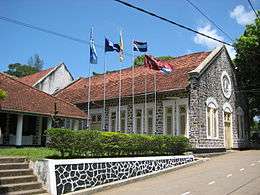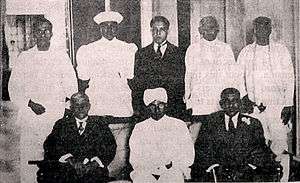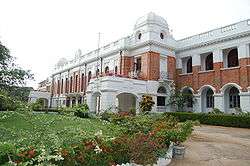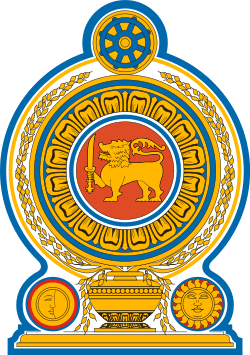C. W. W. Kannangara
| The Honourable C.W.W.Kannangara සි.ඩබ්ලිව්.ඩබ්ලිව්.කන්නන්ගර | |
|---|---|
.jpg) | |
| Father of free Education in Sri Lanka | |
| Minister of Housing and Local Government | |
| Minister of Education of the State Council of Ceylon | |
| Personal details | |
| Born |
13 October 1884 Randombe, Balapitiya, Sri Lanka |
| Died |
23 September 1969 (aged 84) Colombo, Sri Lanka |
| Nationality | Ceylonese (Sri Lankan) |
| Political party | Ceylon National Congress |
| Alma mater | Richmond College |
| Profession | Lawyer |
Christopher William Wijekoon Kannangara (Sinhala:සි.ඩබ්ලිව්.ඩබ්ලිව්.කන්නන්ගර;13 October 1884 – 23 September 1969) was a Sri Lankan lawyer and politician. Rising up the ranks of Sri Lanka's movement for independence in the early part of the 20th century, he became the first Minister of Education in the State Council of Ceylon, and was instrumental in introducing extensive reforms to the country's education system that opened up education to children from all levels of society.
Born in rural town in Balapitiya, South, Sri Lanka, his academic prowess enabled him to win a scholarship to Richmond College, Galle, a prestigious national school at the time. Initially working as a lawyer after leaving school, he entered politics as the movement for independence was gathering strength in Sri Lanka. Kannangara was first elected to the Ceylon Legislative Council in 1923 and then to the State Council. He also served as the President of the Ceylon National Congress.
As Minister of Education in the State Council, Kannangara introduced extensive reforms to the education system of Sri Lanka throughout the 1940s. They befitted thousands of underprivileged students in rural parts of the country by making education free for all students. He also began a Central Colleges scheme, which established high quality secondary schools in rural areas of the country. Kannangara's significant achievements in areas of education have led him to being commonly referred to as the Father of Free Education in Sri Lanka.[1][2]
Early life
Crestoper William Wijekoon Kannangara was born on 13 October 1884, in Randombe, a rural village at Balapitiya in the south of Sri Lanka.[2] The son of John Daniel Wijekoon Kannangara, the Deputy Fiscal Officer in the Balapitiya Courts, and Emily Wijesinghe, he had his primary education at the Wesleyan Missionary School in Randombe.[3]

Kannangara showed great educational promise as a child, and his achievements were recognised by Rev. J.H Darrel, the Principal of Richmond College, Galle who was the chief guest at a prize giving of the Wesleyan Missionary School. After noticing that Kannangara won most of the available prizes, he is said to have remarked "Son, you may have to hire a bullock cart to take home the books you collected at this prize giving."[4] Darrel also gave Kannangara a chance to sit for a Richmond College Foundation scholarship exam. Excelling in Mathematics in the exam, he won the scholarship, receiving an award for free board and lodging at Richmond College. There he received the education of an elite school of the times, far superior instructions to that offered at his rural school.[4]
Kannangara was regarded as an excellent all-round student at Richmond, leading the Ceylon and British Empire list in Mathematics at the Cambridge Senior Examination in 1903.[5] He also captained Richmond College in first eleven cricket in 1903, and was a member of the school soccer team the same year, winning colours for his performances.[4] He was also regarded as a fine debater and actor.[3] After leaving school, he taught Mathematics first at Richmond College and then Prince of Wales College, Moratuwa and Wesley College, Colombo.[5] While teaching he studied law, passing out as an Attorney at law in 1910.[6] He set up his first law practice in Galle the same year.[2] He married Edith Weerasooriya in 1922.[3]
Politics
State council


Kannangara joined Anagarika Dharmapala's historically significant temperance movement, and worked actively with its leaders, including Sir D.B. Jayatilleke, D.S. Senanayake, F.R. Senanayake and Arthur V. Dias.[3] He rose to national prominence as a lawyer defending leaders of the Sri Lankan independence movement and others who were persecuted by the colonial British administration during the period of martial law which following the Riots of 1915. This also drew him into national politics, and in 1923 he entered the Legislative Council of Ceylon, winning a by-election on 13 April 1923 for a seat in the Galle District made vacant by the demise of O.C. Tillekaratne by 1969 votes to 115. He was re-elected the following year polling 4,177 votes, opposed to 2310 for his nearest opponent.[2][4][6] Following the recommendations of the Donoughmore Commission, the State Council was established in 1931, succeeding the Legislative Council as the national legislature. Kannangara was elected to the State Council in 1931 and again in 1936.[2] He also became the President of the Ceylon National Congress in 1931.[3]
For the first time, the State Council, which had its members elected via universal suffrage, compromised Executive Committees and Ministers.[7] Kannangara was appointed as the first chairman of the Executive Committee of Education in the State Council and thus became the first Minister of Education of Sri Lanka in 1931.[7] Apart from Kannangara, the Executive Committee of Education consisted of H. W. Amarasuriya, W.T.B. Karaliyadda, A. Ratnayaka G.R. De Zoysa, P.E. Madawela and Dr. S. A. Wickramasinghe.[4] He is also notable for being the first minister to wear the National costume in the State Council.[3] During World War II, he was a member of the War Council.
Education reforms
Executive Committee of Education exercised its powers to create new regulations paving the way for the establishment of a new system of education in Sri Lanka.[7] The new system was expected to ensure that education was provided with equal opportunities for all children in the country, irrespective of social class, economic condition, religion and ethnic origin.[7] Whilst the education in vernacular schools had been free prior to the reforms due to government grants to cover the cost of teaching and local philanthropists providing the buildings, equipment and the books, it was not standardised.[8] In 1942 a special committee was appointed with Kannangara as chairman to report on the status of education in the country. Among the recommendations for providing "lasting value to the nation" given in the report, which was published in 1943, were that[7]
- Education should be free from the Kindergarten to the University.
- The mother tongue should be used as the medium of instruction in the Primary Schools.
- English should be taught in all schools from standard III.
- A curriculum for the child which would develop its "head, heart and hands" should be introduced. In other words, the education of the emotions is as necessary as the education of intellect and practical ability for the well-being of the child.

As Minister of Education Kannagara was placed in charge of implementing the recommendations. Among the reforms he introduced, which came into operation on 1 October 1945,[3] were to make education free of charge for all students, to ensure that every student was provided with instruction in the religion of his/her parents, to prevent teachers from been exploited by managers of schools by having their wages paid directly by the government and to make adequate provisions for adult education in the country.[7]
He also established a series of central schools (Madhya Vidhyala), modelled on Royal College, Colombo, in locations outside major cities. These took high quality secondary education to the rural outstations of the country.[2] His objective was to create a central school in every electorate in the country, and as such, while in 1941 there were three central schools in the country; by 1945 the number had increased to 35, and to 50 by 1950.[4] First Central College established in Akuramboda, Matale.In 1943 Kannangara also launched an annual scholarship program, which provided the opportunity for the 20 best performers of the scholarship exam to get free board and lodging in Central School hostels.[7]
During his 16-year period as Minister of Education, he also upgraded ancient pirivenas, educational establishments for Buddhist monks, and established the University of Ceylon, the first University in Sri Lanka. Further, Kannangara took steps to abolish the two tier school system, where English was taught to privileged students and the vernacular language was taught to the rural masses.[2] While he laid emphasis on teaching Swabasha (native languages) in schools, he also advised that students should learn English to compete in the modern world.[4]
Opposition
Kannangara however faced significant opposition to his move to establish free education in the country, especially from socially and economically privileged groups who has enjoyed the significant advantages offered to them by the British.[2] Significantly, this included a number of C.W.W Kannangara's political colleagues, including D.S. Senanayake, the first Prime Minister of Sri Lanka.[9] Kannangara spoke for six and a half hours to convince other members of the council to vote for the bill, and was supported in his efforts by H. W. Amarasuriya, Dudley Senanayake, J. R. Jayewardene, Sir Oliver Goonetilleke and Dr. N. M. Perera. There was also a public campaign launched by Dr. E. W. Adikaram, Professor G.P. Malalasekera and Mr. L. H. Metthananda to support the bill, which was eventually passed in the State Council in July 1945.[3]
Post Independence
Hon. C.W.W.Kannangara's strong interests were not confined only to the spread of free education. He was a strong supporter of the cause to spread Buddhism in the West then gaining increasing public support in Sri Lanka in the immediate post - independence period. At a Public Meeting held at Ananda College, Colombo on May 30, 1953 which was presided by Hon. C.W.W.Kannangara, then Minister of Local Government, to make public the findings of the survey carried out by Asoka Weeraratna (Founder and Hony. Secretary of the Lanka Dhammaduta Society - later known as the German Dharmaduta Society )on the current state of Buddhist activities in Germany and the prospects for a Buddhist Mission to Germany before the Buddha Jayanthi celebrations in 1956, Hon. C.W.W. Kannangara moved the following Motion: " This House is of the opinion that the public of Ceylon should fully support the efforts of the Lanka Dhammaduta Society for the establishment of the Sambuddhasasana in Germany and propagate Buddhism in Europe ". The Hon. C.W.W.Kannangara further said that the Lanka Dhammaduta Society was going to serve one of the greatest causes of Buddhism launched after the Great Emperor Asoka of India. He therefore urged that all Buddhists should back the Society in every way in order to help it to establish the Buddhasasana firmly in Germany He showed his unstinting support for the cause of Buddhist missionary work in the West by attending several of the public meetings of this Society namely the launch of the One Million Rupee Fund (Dasa Laksha Aramudala) held at the Colombo Town Hall on September 6, 1954 which was presided by Hon. Dudley Senanayake (then an ex Prime Minister of Ceylon) and the opening of the new Headquarters of the German Dharmaduta Society at 417, Bullers Road, Colombo 07, by Hon. S.W.R.D Bandaranaike, then Prime Minister of Ceylon, on August 7, 1956.
Hon. C.W.W. Kannangara, in his capacity as the Minister of Local Government attended the opening ceremony of the Sixth Buddhist Council in Rangoon, Burma which commenced on May 17, 1954 and he read out the Message of Right Hon. Sir John Kotelawala, then Prime Minister of Ceylon, welcoming the inauguration of the Sixth Buddhist Council.
His achievements in parliament in the field of Education did not however translate to popularity among the people of his electorate, and he lost his seat in parliament in the General Elections of 1947. Ironically he was defeated in the poll for the Matugama electorate by Wilmot A. Perera, the founder of the popular local school Sri Palee College.[2][4]
Hon. C.W.W.Kannangara was then appointed Ambassador to Indonesia, a post in which he served from 1950 to 1952. He returned to politics again, and was elected to parliament from the Agalawatta Electorate in 1952, defeating S.A. Silva. He was appointed Minister of Housing and Local Government in the new cabinet.[2][4] He was most possibly denied the position of Cabinet Minister of Education as some leading figures in the government did not wish to give him the opportunity to carry forward further reforms to the education system.[6]
C.W.W. Kannangara retired from active politics in 1956, and died on 23 September 1969.[4] His remains were cremated according to traditional Buddhist rites at the Anderson Golf Links which later became the site of the Bandaranaike Memorial International Conference Hall (BMICH) at Bauddhaloka Mawatha, Colombo 07. There are a number of institutions named after him in Sri Lanka.[10]
A statue of C. W. W. Kannangara has been erected at the Parakramabahu Central College in Polgahawela.[11]
A new book under the title ‘No Pearl of Greater Price’ being a biography of C.W.W Kannangara written by the erudite Buddhist Scholar Dr. Ananda Guruge was released on December 28, 2013 at a public meeting held at the All Ceylon Buddhist Congress Auditorium
See also
References
- ↑ Context of Educational Reforms Then and Now, Dr. Mohottige Upali Sedere, Educational Resource and Information Center
- 1 2 3 4 5 6 7 8 9 10 "The great reformer of education". The Sunday Times. 8 October 2006. Retrieved 7 October 2007.
- 1 2 3 4 5 6 7 8 Wijenayaka, Walter (24 September 2003). "C.W.W. Kannangara: Father of free education". The Daily News. Retrieved 8 October 2007.
- 1 2 3 4 5 6 7 8 9 10 Epasinghe, Premasara (6 September 2006). "Father of free education in Ceylon". The Daily Mirror. Retrieved 7 October 2007.
- 1 2 A man of many facets – II by Savimon Urugodawatta (The Island) Retrieved 28 October 2015
- 1 2 3 Jayetilleke, Rohan L. (15 October 2004). "How C W W Kannangara resisted the Bastions of Reaction". The Daily News. Retrieved 9 October 2007.
- 1 2 3 4 5 6 7 "Historical Overview of Education in Sri Lanka". Ministry of Education, Sri Lanka. Archived from the original on 16 July 2007. Retrieved 7 October 2007.
- ↑ When the 'nobodies'made their mark, The Sunday Times Retrieved 11 February 2015.
- ↑ D.S. Senanayake was ardently opposed to Kannangara's educational reforms, especially that proposal to abolish school fees in the elite "denominational schools". It was notable that the bill was taken up for vote in the State Council at a time when Senanayake was out of the country – De Silva, K. M. 1981. A history of Sri Lanka. London: C. Hurst. p.472-474
- ↑ Gateway contributes to rebuilding C.W.W Kannangara school
- ↑ target.lk: Statue Of C W W Kannangara Unveiled, Retrieved 29 January 2012
External links
- Ministry of Education, Sri Lanka
- CWW Kannangara central college, Mathugama (First Central College in Sri Lanka)
- LMDs 50 greatest Sri Lankans since independence
- Ambassador to Indonesia
- Methek Kathawa 1 Divaina
- Methek Kathawa 2 Divaina
- ශ්රී ලංකාවේ බිහිවූ එකම දාර්ශනික අධ්යාපන අමාත්යවරයා
